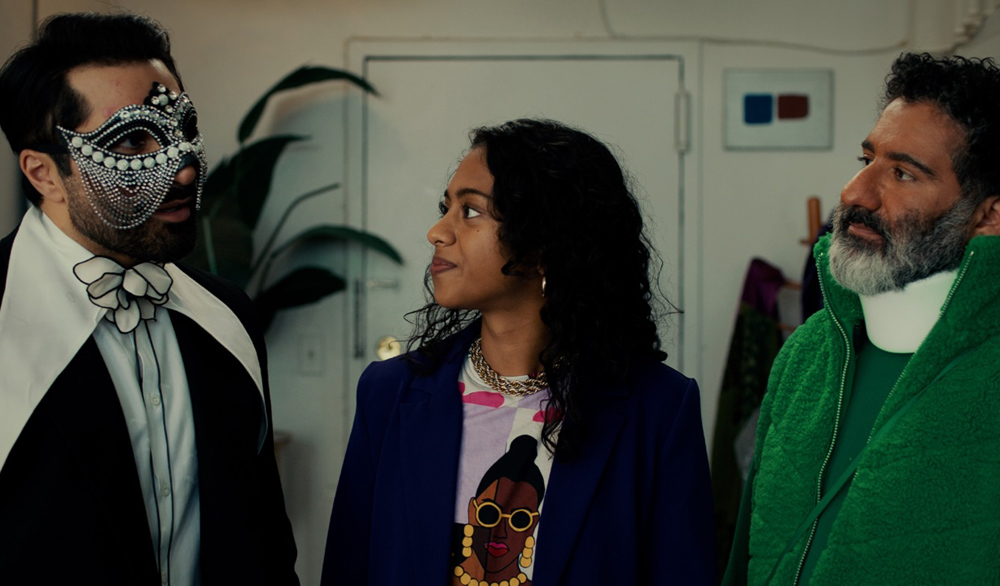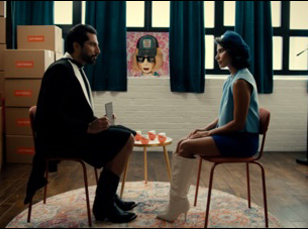For someone who makes it his business to look at faces all day as a would-be skincare entrepreneur, Akram (Akbar Hamid) has an unusual amount of trouble reading the one of his best friend Ruby (Diane Guerrero) after unveiling an ad for his new line of moisturizing creams called “Poreless.” It’s a work-in-progress — as is Akram, it turns out — and after investing all of his savings into a prototype, he may be patting himself on the back for securing a place in an inaugural product pitch for the makeup company Beautè, but Ruby isn’t sold when he seems to be hiding who he is in his first commercial, spouting platitudes as one would see in any ad like “I am perfect, I am whole” when she knows he’s anything but generic. A debate ensues about how much he’d feel comfortable revealing and when Akram insists “he’s Matt Bomer gay, not Liberace gay,” or Riz Ahmed Muslim, not Genie from Aladdin Muslim,” the comparisons lead Ruby to worry that Poreless won’t go very far to make people feel comfortable in their own skin when the person pushing it clearly isn’t.
“Poreless” the film, on the hand, exudes far more confidence and as director Harris Doran openly acknowledges is meant to be an advertisement for its star Hamid, who actually did get his start in real life in marketing as the CEO for The 5th Column, working on brand campaigns for the likes of Rémy Martin, Van Cleef & Arpels, L’Oréal, and NYX Cosmetics. However, along with “Queen of My Dreams” director Fawzia Mirza, Doran found him to be too charismatic to stay behind the scenes and together they have fashioned an exuberant comedic short based loosely around aspects of Hamid’s own experience finding success when he’s been true to himself. Dressing Akram up in a modest black-and-white suit that becomes more and more ornate as “Poreless” wears on, the film is rich with irony when a blemish breaks out on the day of the big contest and the more he attempts to cover himself up, going so far as to wear a “Phantom of the Opera” style mask, the more he is forced to reveal who he really is in front of a pink-clad panel of judges that includes “Moonlighting”’s Allyce Beasley, “Give Me Pity” director and star Sophie Von Haselberg, Lucy Owen and Gia Crovatin.
As far as coming out parties go, “Poreless” couldn’t be too much more fun and when those around Akram, including his brother and sister (Parvesh Cheena and Sureni Weerasekera, respectively), show their support for who he is, you can’t help but feel part of the power of Hamid’s own performance can be traced to that belief among the crew that assembled around him for his acting debut. After first premiering at the Aspen Shortsfest earlier this spring, “Poreless” is making itself known on the festival circuit with a series of stops this June at Tribeca, Bentonville and Frameline and in the midst of preparing for their New York debut, Doran and Hamid spoke about how they came to team up on the project, the key to creating supportive vibes on set and blending in Hamid’s personal style into the character he ended up playing.
Harris Doran: Akbar wanted to be an actor, and we have a mutual friend Fawzia [Mirza] who Introduced me to Akbar and I was actually coaching him. He was so amazing and I [said], “You should do a short film to start your career.” So he and Fawzia linked up and they were going to do a short film together and then Akbar [said], “I have this great idea” and it happened to be an idea of a script that I had already written, so I was like, “I will write you a script.”
Akbar Hamid: Fawzia has been behind some incredible films, [like her debut] “Queen of My Dreams,” and when Fazia and I were introduced, she was so kind to hear me out on what some people might say were delusional dreams. She connected me with Harris and as they both got to know me, the character of Akram developed based off of a version of me — it’s a very campy, over the top version of me, which is which is fabulous and fine in a beauty world.
Harris Doran: Fawzia and I ended up going back and forth [about] how can we showcase this amazing human being Akbar? He’s so unique and so fabulous and we wrote it together.
Akbar Hamid: What’s really important is Harris and Fazia both brought such incredible writing perspectives, with her being Muslim South Asian and queer and Harris being gay and queer and fabulous, but with a different perspective and and that allowed us to create a character that lived in a comedic absurd world that wasn’t anything trauma-related. A lot of times you’ll see stories [like that], especially around Muslim characters, and it was really exciting for me when they wrote it to see a character that’s just living in this funny world. I’m really inspired by Dan Levy, and I feel I did embody a gay Muslim Dan Levy, but I’m very lucky to be able to work with them both.
Harris, this seems to be a similar situation to your previous short “Fuck Em Right Back,” where you’re able to identify in certain ways to the character, but clearly from a different background. Is that intimidating or something to embrace as you bring out a personality?
Harris Doran: I love it. With “Fuck ‘Em Right Back,” Ddm was this incredible rapper, and when I was writing that, [I thought] there’s so many interesting things about him and I was able to create this fictional world based on his world. I brought that up in terms of Akbar. There’s so much fabulous about him, and that actually was very specifically the approach to [“Poreless”] was to riff on the real life [of Akbar], which is not exactly his real life.
Akbar, was there anything that was important when you were gonna be the face of this?
Akbar Hamid: I wanted to have an inspirational message. Comedy is really this great connector and I wanted to make sure whatever lesson that you’re walking away with is something that comes through the lens of comedy and also showcasing a person who represents multiple communities — [in this case, the] the queer, Brown, South Asian Muslim — in a way where you can laugh with these communities rather than at them. We’ve seen that in the first screening at Aspen Shorts Fest, which we were so proud to be part of, that everybody was erupting in laughter. Old, young, white, brown, Black. That was really nice to see and I think people see themselves in different characters. You might be like, “Oh my God, that’s a bit like me,” but you can laugh at it rather than [think] I’m a horrible person because you can realize that we all have these judgments sometimes and it was important for it to be real and rooted in comedy.
You really have quite a few characters for a short and a star-studded ensemble to play them. How did you get a cast together?
Harris Doran: It was a blast. A lot of the people are people that the three of us know, except for Sureni [Weerasekera]. And Gia [Crovatin] was through a casting director, but she wasn’t auditioned. When we were looking at actresses for this role [of Akram’s sister Asma], I looked at all of these people and she was actually the only one that I wanted because she felt so right. I was an acting teacher for years and I’ve directed so much, so when I see a clip of someone I can usually just tell, but then she nailed the audition. She’s so wildly talented— she sang at the audition. She can do anything. Otherwise, it was offering people that that we knew.
Akbar Hamid: Yeah, there’s so many people in our collective networks that came to mind when we thought of the characters. I’m so grateful to friends like Diane Guerrero who are such incredible talents and take the time to be part of such an ambitious short. But I think everybody was really moved by the script and thought it was funny, so they wanted to participate. And because everybody was genuinely excited, I was really grateful as as a first-time actor that everybody was there to support me and everybody was so helpful. I heard from Harris and Fawzia and a lot of people on set that I got really spoiled because it’s not always like that, but it was it incredible to have that because now I can go onto any set and I know what the best practices are and aware if I have a bad experience if that’s not the case everywhere.
Harris Doran: They were an incredible crew and when I hire a crew, I try to actually interview everyone, even down to the PAs because I want to know who is this person? Why are they interested in the set that’s actually being built? It was incredibly diverse and I don’t think of diversity for diversity’s sake, but if you have a cast that’s extremely diverse, which we do, I want for when people walk on to set that any everyone feels like it’s their set. They’re not the only person of their identity and they can walk on set and they feel like this is mine, too. That makes a fertile space for the actors to just feel free.
Was there anything that happened that you might not have expected but you could embrace?
Akbar Hamid: There was so much. The scene with Diane where we talked about Genie from Aladdin was improv, and there was a little bit more, but the part Harris ended up using worked so well. Again, being first time on on set, it was beautiful to have Diane do that with me because it you know It got me in a really nice flow and it was like we’re having this real conversation. And it was also interesting to see how directors have to cut things and move scenes around. There were some fun scenes and moments that I really was excited about that had to get cut or moved, but were put back in different ways. That’s why I’m so in awe of how it’s all pieced together and Harris still managed to put back some of the parts that I really wanted because they were caught in other scenes.
A particularly great element is how Akram’s costume builds up over the course of the story from this relatively plain black suit to a more and more ornate get-up with masks. What was it like to figure out?
Akbar Hamid: Allison [Calhoun], the costume designer, is actually the costume designer on “Nobody Wants This” so she is a genius and she went all out on every single costume.
Harris Doran:Bbut also Akram’s character is based on him, so some of that are his real clothes and is very much aligned with his actual style. I wanted to riff on that in terms of [thinking] what if the whole movie is high fashion and we decided that he would be black and white and Sureni would be purple and Parvesh [Cheena’s character Arif] should be green and the women would be red and pink, so there was a palette that was chosen of how to do it so that you could recognize when you see black and white, it’s Akbar.
Akbar Hamid: The fact that Harris and the team were able to secure [Allison] for this and she was genuinely so excited was brilliant. I’m such a fashion person, so the Karen/Beauty Queens were my personal favorite. They were dressed in a lot of vintage Carolina Herrera and Valentino and [Allison] really pulled from different fashion libraries. We sourced from a lot of different places and the color blocking was so crucial and the piece in the end with the bow was mine. That’s my Yves Saint Laurent shirt and it just works so perfectly. It was fun to be able to do mix [my own clothes into the wardrobe]. It adds a level of comfort when you’re on set and feel like yourself.
Harris Doran: You were wearing that shirt on your Instagram and I used that picture [as a reference for the movie]. And the masks were all custom.
 This is probably a silly question, but was there anything special that had to go into the skin cream? Because that was a lighting decision as much as a prop for the film.
This is probably a silly question, but was there anything special that had to go into the skin cream? Because that was a lighting decision as much as a prop for the film.
Harris Doran: We had whole Zooms about how that was going to work. That was a combination of makeup, lighting, camera and a bunch of things, like what is the camera move — the zoom in or zoom out? We had ideas of going really close into his left pore and back out and we even had a cartoon [idea]. We finally found something a little simpler in order to do that, but the cream was just a regular cream and the makeup there [involved] whole different stages. Andrew [Sotomayor] is a genius makeup designer and an Emmy Award winner, so he was the one that figured that out. Then also in post-production, I had our colorist who also does effects do a glow smoothing thing, so there were multiple stages of how that effect happened.
What’s it been like to start getting this out into the world?
Harris Doran: I am so thrilled because the movie is doing really well and for Akbar because this the purpose of this was to show him off to the world and it’s actually happening.
Akbar Hamid: Thank you. Yeah, it’s been so surreal. The festivals are of course exciting and you never know how people are going to react, especially with close friends and family. Everybody has absolutely loved it and I only recently came out to my family officially, being Muslim and South Asian. We all have different journeys and I really don’t think there was a culmination until this film because it really is a true declaration of who I am on a massively public scale and also is meant to be an inspiration for anyone, but really for that South Asian Brown Muslim community that should be as fabulous as they want to be. That’s been a lot of the feedback, even from the small snippets we’ve shared on Instagram You know through word-of-mouth that people are really feeling that and that’s why I’m excited for platforms like Tribeca and Frameline and Inside Out because more people need to see it. I just want millions of people to be able to watch it and laugh and feel seen.
“Poreless” will screen at the Tribeca Festival as part of the Shorts: Family Matters program on June 11th at 9 pm at Shorts Theater at Spring Studios and June 14th at 2:15 pm and June 15th at 8:45 pm at AMC 19th St., East 6.





